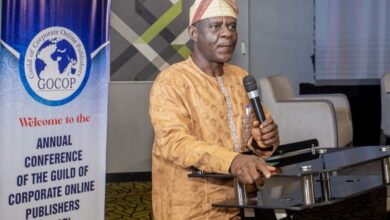Hospitality Advocate decries institute’s call for banning of Ponmo consumption
 A Tourism and Hospitality Advocate, Wale Ojo-Lanre, says consumption of “Ponmo”, cow skin, is not contributing in anyway, to the downward slide of production in leather industry in Nigeria.
A Tourism and Hospitality Advocate, Wale Ojo-Lanre, says consumption of “Ponmo”, cow skin, is not contributing in anyway, to the downward slide of production in leather industry in Nigeria.
Ojo-Lanre, also the President, Ponmo Consumers Stakeholders in Nigeria, made this clarification in a statement on Tuesday in Ado-Ekiti.
Ponmo is a popular supplement in soups prepared in many Nigerian homes, especially in the Southwestern part of the country where families of different classes are using it as an alternative or together with beef meat and chicken.
Ojo-Lanre, also faulted the claims by Alhaji Mohammed Yakubu, the Director-General, Nigerian Institute of Leather and Science Technology (NILEST), that cow skin (ponmo) consumption was contributing to the downward slide of production in Nigeria’s leather industry.
He was the Director-General, Ekiti State State Council for Arts and Culture and currently, the Senior Special Assistant on Tourism Development to Gov. Kayode Fayemi of Ekiti.
NILEST is a government agency responsible for the promotion of leather production in the Agricultural Research Institute Act of 1975. It conducts research on leather products and the use of local tanning materials in Nigeria.
Yakubu had called for prohibition of Ponmo’s consumption, claiming that its prohibition would be necessary to revive the comatose leather industry in the country.
Ojo-Lanre said that the call for ban of Ponmo by NILEST Director-General would not have been necessary, if the institute had looked inwards through laudable ideas to other ways to increase leather production in the country.
He decried the proposed move by Yakubu to approach the National Assembly to enact law for the ban of Ponmo, a skin product used as adjunct at meals.
According to him, NILEST charged with the sustainability of the leather should think outside the box for sustainable strategies and formulas to shore up leather production, instead of calling for its ban.
Ojo-Lanre said that decrease in leather production in Nigeria was not as a result of ponmo consumption.
He said that ponmo has not only been beyond the reach of the people, but scarce, because of low production and lack of support to the livestock sector.
Ojo-Lanre, also a Tourism Ambassador, urged the institute concerned to research into the low production in leader industry and come up with the viable option of increments, instead of calling for ban of ponmo.
He urged NILEST management to do a proper fact-checking on low production of leather in Nigeria and should not believe that ponmo had drastically affected the output of leather.
The tourism ambassador identified some of the causes of low leather production as no positive intervention from the government, livestock under serious health infection, high cost of drugs due to exchange rate and lack of green pasture, among others.
He called on Nigerians to ask the NILEST when last it organise training and seminars for livestock growers and incentives available for livestock farmers.
According to him, when last has the institute engaged livestock growers and farmers in Nigeria to evaluate their constraints and challenges?
“And, what has it done to address the lack of skills, technology, intermediate inputs and processing equipment battling livestock growers and farmers in Nigeria?











